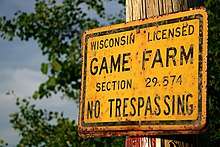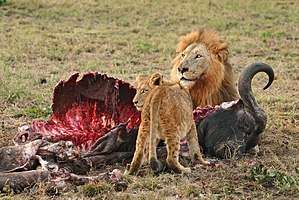Game farm
A game farm is a place where game animals are raised to stock wildlife areas for hunting.[1] The term also includes places where such animals are raised to be sold as food or for photography.[2][3] Their existence has been exemplified within the South African countryside where they have become prevalent. The wildlife that is hunted is used for consumption as well for ecotourism. [4] Local laws in South Africa during the 20th century have allowed the private ownership of wildlife, which has enabled the expansion and economic feasibility of game farms over typical livestock farming.[5]

Game Farming in South Africa
South Africa is considered to be one of the hallmarks for game farms and game reserves. The biodiverse ecosystem that exists in South Africa is the foundation that provides one of the most prosperous game meat in the African continent. The land displays a diverse array of animals such as the Big Five; lion, leopard, rhinoceros, elephant, and Cape buffalo.[6] Game farms are said to have produced new avenues for prosperity such as trophy hunting, game-meat production, and eco-tourism.
 Male lion and cub feeding on a Cape buffalo, Sabi Sand Game Reserve
Male lion and cub feeding on a Cape buffalo, Sabi Sand Game Reserve
Ecotourism Component
Tourism is viewed as key strategy that can eventually lead to economic prosperity which in turn would promote development in the local communities. The South African government has capitalized on this through utilizing their wildlife to promote ecotourism.[7] Post-apartheid, significant developments have been made to achieve success in this area. Today, an abundance of tourists and travelers flock to South Africa with their main goal being to see its natural environment. Game Farms are said to deliver a unique experience because they provide the opportunity for visitors to observe and experience wildlife at close range. The South African government has made efforts to utilize these game farms as developed sustainable ecotourism attractions. Wildlife hunters are extremely attracted to private games farms which can produce higher income compared some of South Africa’s most successful nature reserves. The commercial success of these game farms has forced many agricultural farms to adapt and be converted into game farms.[8]
Controversy in the Eastern Cape
Game farming in the Eastern Cape has been cited as land-use practice issue which has left many feeling disenfranchised This stems from the context of wealth, class, and race which are said have created a diverse range of problems for local communities. People who do not have the financial structure to enter a game farm are said to appropriate bushmeat through illegal hunting where poachers are the primary actors. Structural inequalities between various stakeholders are at the epicenter of the issue.[9] Game farms create network that is internationally proactive and interconnected but fractured at the local level due to racial inequalities that have plagued South Africa. This dichotomy of the two networks have created spaces for international clients and local elites to congregate and engage in trophy hunting due to private ownership which in turn ignores the advancement of rural employment.[10]
See also
Notes
- Ingersoll 1920.
- Cheng, Selina (30 April 2017). "Love wildlife photos? There's a good chance they weren't shot in the wild". Quartz (publication). Retrieved 30 April 2017.
- Pitman, Ross T; Fattebert, Julien; Williams, Samual T; Williams, Kathryn S; Hill, Russell A; Hunter, Luke T B; Slotow, Rob; Balme, Guy A (July 2016). "The Conservation Costs of Game Ranching" (PDF). Conservation Letters. 10 (4): 403–413. doi:10.1111/conl.12276.
- Hart, Adam. "Conservation versus profit: South Africa's 'unique' game offer a sobering lesson". The Conversation. Retrieved 2019-03-10.
- Ngubane, Mnqobi; Brooks, Shirley (July 2013). "Land beneficiaries as game farmers: conservation, land reform and the invention of the 'community game farm' in KwaZulu-Natal". Journal of Contemporary African Studies. 31 (3): 399–420. doi:10.1080/02589001.2013.811790. hdl:10566/3154. ISSN 0258-9001.
- Claassens, Carina. "The Best Safari and Game Reserves in South Africa". Culture Trip. Retrieved 2019-03-17.
- Binns, Tony; Nel, Etienne (2002-09-01). "Tourism as a local development strategy in South Africa". The Geographical Journal. 168 (3): 235–247. doi:10.1111/1475-4959.00051. ISSN 0016-7398.
- Hoogendoorn, Gijsbert; Meintjes, Daniel; Kelso, Clare; Fitchett, Jennifer (2018-07-23). "Tourism as an incentive for rewilding: the conversion from cattle to game farms in Limpopo province, South Africa". Journal of Ecotourism. 0: 1–7. doi:10.1080/14724049.2018.1502297. ISSN 1472-4049.
- Brandt, Femke; Josefsson, Jenny; Spierenburg, Marja (2018). "Power and politics in stakeholder engagement: farm dweller (in)visibility and conversions to game farming in South Africa". Ecology and Society. 23 (3). doi:10.5751/ES-10265-230332.
- Pasmans, Thijs; Hebinck, Paul (May 2017). "Rural development and the role of game farming in the Eastern Cape, South Africa". Land Use Policy. 64: 440–450. doi:10.1016/j.landusepol.2017.03.010.
References
![]()